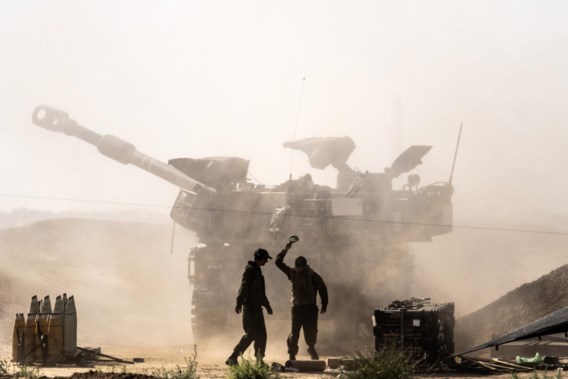To discourage a large-scale offensive on Rafah and its one and a half million civilians, US President Joe Biden is exerting unprecedented pressure on Israel. During an interview with CNN, he announced that the US will suspend a delivery of 3,500 bombs to the Jewish state. In concrete terms, this concerns 1,700 bombs of 225 kilos and 1,800 of 450 kilos. It is highly controversial weaponry that has been deployed in densely populated neighborhoods in recent months and has caused many civilian casualties.
A shipment of so-called missile guidance kits, which ensure that bombs can be used with precision, would also not be delivered. Biden indicated that he is also considering freezing orders for artillery shells for tanks.
“I have made it clear to Bibi and his war cabinet that they do not have our support to attack densely populated neighborhoods,” Biden told CNN. “We continue to support Israel’s security policies, but we cannot allow them to wage war in areas where many civilians live.”
The Israeli war cabinet appears unimpressed by Biden’s diplomatic pressure for the time being. It has its army carry out heavy bombardments on Rafah. Defense Minister Yoav Gallant told Israel’s “enemies and friends” that it will do whatever it takes to achieve its war goals in Gaza.
According to the residents of Rafah, the bombs are falling not only in the east, but also in the center of the city. “There were more bombings in the last 24 hours than in the last two weeks.” Louise Wateridge, spokesperson for the UN agency UNRWA, testified that her office in the west of the city was “rocked to its foundations”. Wateridge also released images from besieged Rafah showing civilians rushing to flee the city.
“Biden in the heart of Hamas”
For Israel, military logic prevails. Apparently it only really wants to talk about a ceasefire once the Hamas fighters in Rafah have been defeated. Hamas leader Yahya Sinwar, according to Israel the mastermind behind the murderous attacks of October 7, is also still at large. The fact that the armed Hamas structure would remain partially intact even after the signing of the ceasefire is too great a security risk for the Israeli war cabinet – and for many Israeli citizens. Nobody wants a repeat of October 7.
The far-right ministers of Benjamin Netanyahu’s cabinet even appear to be mocking Biden’s decision. National Security Minister Itamar Ben-Gvir posted on his X account the words Biden and Hamas with a heart in between. Likud MP Tally Gotliv is threatening to bomb Gaza with imprecise rockets. “If the Americans no longer want to supply us with precise missiles with which we can specifically destroy a room or a building, then we should just use our non-precise bombs with which we can demolish ten buildings in one go. We have the right to defend ourselves.”
An important question is to what extent the suspension of US arms deliveries will have a real impact on the Rafah offensive. Although it is not known how large Israel’s weapons reserves are, everyone seems to assume that the Israeli army has sufficient firepower to invade Rafah. Biden’s decision currently seems more like a tool of political pressure.
Hospitals without power
Everything indicates that the humanitarian catastrophe in Rafah is getting worse. One and a half million people are packed together in the city, and 80,000 civilians have left Rafah in recent days. Tedros Adhanom Ghebreyesus, director of the World Health Emergency (WHO), warns that the city’s hospitals will lose power in three days. Since the Israeli army captured the border crossing with Egypt on Tuesday, fuel tankers have been blocked on the Egyptian side. One of those hospitals, the Al Najjar hospital, has already had to close its doors. “In the name of humanity, there must be a ceasefire soon,” the WHO chief said.
The negotiations on the ceasefire in Cairo are very difficult. On Monday, Hamas agreed to a text that largely corresponds to the draft that Israel submitted last month. But Prime Minister Netanyahu says there are still many points of contention and sent only low-level negotiators to Cairo. They were instructed not to give in to Israeli conditions “on the release of the hostages and on crucial points that must guarantee Israeli security.” In concrete terms, Netanyahu wants Hamas to accelerate the release of the 132 remaining hostages and that the Palestinian prisoners that Israel releases in exchange do not include severely convicted prisoners. Hamas makes it clear that it no longer wants to negotiate on these points.
Meanwhile, the Israeli army also continues to bomb other areas in Gaza. The Zeitoun neighborhood in Gaza City came under fire. Hundreds of civilians had to flee their homes.


